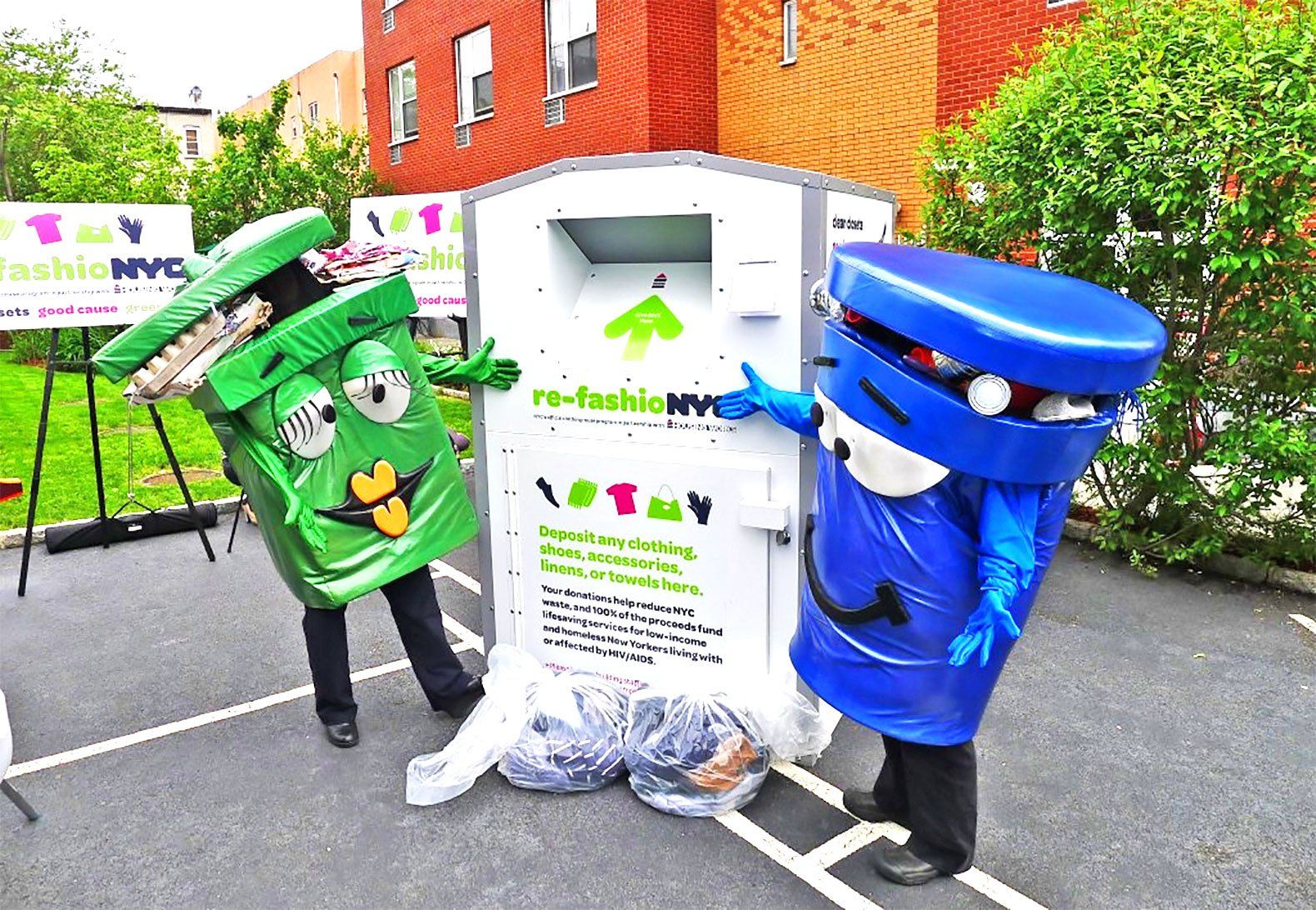Giving a Boost to
NYC Recycling Efforts
CIVITAS has identified the disposal of solid waste – garbage – as one of the biggest challenges to the environment of New York City, of the UES and of East Harlem.
In assessing the impact of a 1989 NYC Law requiring recycling, a 2005 NYC Waste Characterization Study (WCS) found that around 35% of everything discarded by NYC residents consists of materials that residents are required to recycle, but only about 16% is actually being recycled citywide! The recycling rate is significantly below acceptable levels in New York City in general, and in the UES and East Harlem in particular.
With New York City’s plan to double recycling rate by 2016, CIVITAS has determined that one of the best ways to boost the recycling rate upward is to bring effective recycling education into the public schools, to NYCHA public housing, and to private apartment buildings by embarking on a three-pronged recycling initiative. The recycling initiative, focusing on East Harlem and the Upper East Side (UES), takes advantage of partnerships with three entities:
1) Cafeteria Culture, an innovative and hugely successful non-profit, to set up an in-school recycling education program;
2) New York City Housing Authority (NYCHA) and its residents to set up effective public housing recycling programs; and
3) Department of Sanitation to broaden the reach of its Apartment Building Recycling Initiative.
With less garbage headed to landfills, it is safe to assume that toxic methane emissions will be lower. Similarly, New York City’s carbon footprint and its contribution to global warming will be smaller, and the air will be cleaner. It is clearly a win-win situation for everyone.
Schools:
CIVITAS hopes to shape a student’s sense of overall environmental awareness and engagement while simultaneously leading to higher recycling rates at the school and ultimately at home. Early in 2013, CIVITAS laid the groundwork for building relationships at PS 7, located at 120th Street near Third Avenue, and then reached out to partner with another not-for-profit, Cafeteria Culture, to bring its innovative Recycling Ranger program to El Barrio.
The goals of Cafeteria Culture are closely aligned with those of CIVITAS, namely to empower students and teach them the how and why of garbage reduction. By furthering students’ knowledge of recycling practices in school, involving the students directly in cleaning up their own cafeteria at lunchtime, and allowing them to work together with kitchen staff, building custodians, teachers and administrators, the students themselves will effect a dramatic turnaround in the solid waste environment of their school. Probably more important, they will have absorbed a lifelong lesson about the importance of recycling to the environment and will bring this lesson home to their families.
The CIVITAS/Cafeteria Culture partnership does not stop at PS7. The goal is to test best practices and to formulate a recycling program that engages students, which over time can be brought into every elementary and middle school in East Harlem and the UES.
NYCHA Public Housing:
NYCHA comprises 40% of East Harlem housing and has no effective recycling program in place. Building on observations of an innovative recycling initiative at NYCHA Grant Houses on Manhattan’s West Side and Betances Houses in the Bronx, and working with the Tenants Board of Taft Houses in East Harlem, CIVITAS is researching ways to improve recycling programs at NYCHA sites by visiting projects, exploring infrastructure improvements, observing best practices, and engaging NYCHA, Taft Tenants, and the City Council to help develop a recycling program at this 9-building NYCHA site.
Private Apartment Buildings:
Residential Buildings comprise about 80% of the UES, and significantly contribute to the neighborhood’s waste disposal. CIVITAS is partnering with Department of Sanitation (DOS) to promote the City’s Apartment Building Recycling Initiative (ABRI) on the UES. This program provides intensive training and support for apartment buildings to take their recycling efforts to the next level.
Back
In assessing the impact of a 1989 NYC Law requiring recycling, a 2005 NYC Waste Characterization Study (WCS) found that around 35% of everything discarded by NYC residents consists of materials that residents are required to recycle, but only about 16% is actually being recycled citywide! The recycling rate is significantly below acceptable levels in New York City in general, and in the UES and East Harlem in particular.
With New York City’s plan to double recycling rate by 2016, CIVITAS has determined that one of the best ways to boost the recycling rate upward is to bring effective recycling education into the public schools, to NYCHA public housing, and to private apartment buildings by embarking on a three-pronged recycling initiative. The recycling initiative, focusing on East Harlem and the Upper East Side (UES), takes advantage of partnerships with three entities:
1) Cafeteria Culture, an innovative and hugely successful non-profit, to set up an in-school recycling education program;
2) New York City Housing Authority (NYCHA) and its residents to set up effective public housing recycling programs; and
3) Department of Sanitation to broaden the reach of its Apartment Building Recycling Initiative.
With less garbage headed to landfills, it is safe to assume that toxic methane emissions will be lower. Similarly, New York City’s carbon footprint and its contribution to global warming will be smaller, and the air will be cleaner. It is clearly a win-win situation for everyone.
Schools:
CIVITAS hopes to shape a student’s sense of overall environmental awareness and engagement while simultaneously leading to higher recycling rates at the school and ultimately at home. Early in 2013, CIVITAS laid the groundwork for building relationships at PS 7, located at 120th Street near Third Avenue, and then reached out to partner with another not-for-profit, Cafeteria Culture, to bring its innovative Recycling Ranger program to El Barrio.
The goals of Cafeteria Culture are closely aligned with those of CIVITAS, namely to empower students and teach them the how and why of garbage reduction. By furthering students’ knowledge of recycling practices in school, involving the students directly in cleaning up their own cafeteria at lunchtime, and allowing them to work together with kitchen staff, building custodians, teachers and administrators, the students themselves will effect a dramatic turnaround in the solid waste environment of their school. Probably more important, they will have absorbed a lifelong lesson about the importance of recycling to the environment and will bring this lesson home to their families.
The CIVITAS/Cafeteria Culture partnership does not stop at PS7. The goal is to test best practices and to formulate a recycling program that engages students, which over time can be brought into every elementary and middle school in East Harlem and the UES.
NYCHA Public Housing:
NYCHA comprises 40% of East Harlem housing and has no effective recycling program in place. Building on observations of an innovative recycling initiative at NYCHA Grant Houses on Manhattan’s West Side and Betances Houses in the Bronx, and working with the Tenants Board of Taft Houses in East Harlem, CIVITAS is researching ways to improve recycling programs at NYCHA sites by visiting projects, exploring infrastructure improvements, observing best practices, and engaging NYCHA, Taft Tenants, and the City Council to help develop a recycling program at this 9-building NYCHA site.
Private Apartment Buildings:
Residential Buildings comprise about 80% of the UES, and significantly contribute to the neighborhood’s waste disposal. CIVITAS is partnering with Department of Sanitation (DOS) to promote the City’s Apartment Building Recycling Initiative (ABRI) on the UES. This program provides intensive training and support for apartment buildings to take their recycling efforts to the next level.



